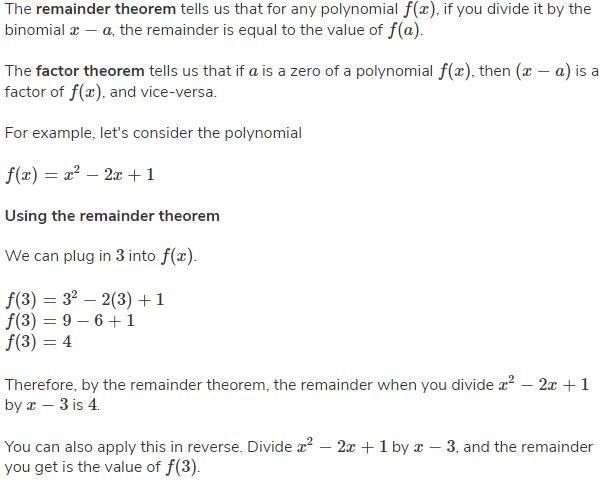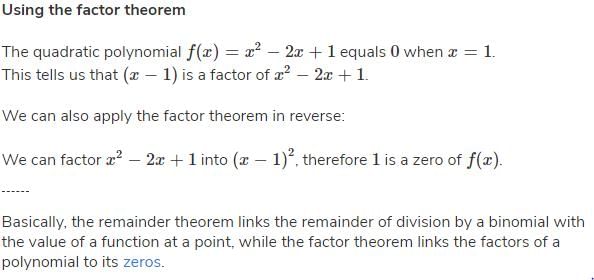Class 9 Exam > Class 9 Questions > What's the difference between factor theorem ...
Start Learning for Free
What's the difference between factor theorem and remainder theorem?
Verified Answer
What's the difference between factor theorem and remainder theorem?


 This question is part of UPSC exam. View all Class 9 courses
This question is part of UPSC exam. View all Class 9 courses
Most Upvoted Answer
What's the difference between factor theorem and remainder theorem?
Factor Theorem vs. Remainder Theorem
Factors and remainders play important roles in polynomial division and factorization. The factor theorem and remainder theorem are two key concepts that help in understanding the relationships between factors, remainders, and roots of polynomials.
Factor Theorem:
- The factor theorem states that if a polynomial \(f(x)\) has a factor \((x - a)\), then \(a\) is a root of the polynomial, meaning \(f(a) = 0\).
- In simpler terms, if you divide a polynomial by \((x - a)\) and the remainder is 0, then \((x - a)\) is a factor of the polynomial.
- The factor theorem is used to find roots or zeros of polynomials by testing different values of \(a\) to see if they make the polynomial equal to zero.
Remainder Theorem:
- The remainder theorem states that when a polynomial \(f(x)\) is divided by \((x - a)\), the remainder is \(f(a)\).
- In other words, if you divide a polynomial by \((x - a)\), the value of the polynomial at \(a\) will be the remainder.
- The remainder theorem is useful for finding the remainder when dividing polynomials and for evaluating polynomials at specific values without fully carrying out the division process.
Differences:
- The factor theorem helps in finding roots or zeros of polynomials, while the remainder theorem helps in finding remainders when dividing polynomials by linear factors.
- The factor theorem focuses on the relationship between factors and roots of polynomials, while the remainder theorem focuses on the relationship between divisors and remainders in polynomial division.
- The factor theorem is used to factorize polynomials by finding linear factors, while the remainder theorem is used to evaluate polynomials and find remainders efficiently.
Factors and remainders play important roles in polynomial division and factorization. The factor theorem and remainder theorem are two key concepts that help in understanding the relationships between factors, remainders, and roots of polynomials.
Factor Theorem:
- The factor theorem states that if a polynomial \(f(x)\) has a factor \((x - a)\), then \(a\) is a root of the polynomial, meaning \(f(a) = 0\).
- In simpler terms, if you divide a polynomial by \((x - a)\) and the remainder is 0, then \((x - a)\) is a factor of the polynomial.
- The factor theorem is used to find roots or zeros of polynomials by testing different values of \(a\) to see if they make the polynomial equal to zero.
Remainder Theorem:
- The remainder theorem states that when a polynomial \(f(x)\) is divided by \((x - a)\), the remainder is \(f(a)\).
- In other words, if you divide a polynomial by \((x - a)\), the value of the polynomial at \(a\) will be the remainder.
- The remainder theorem is useful for finding the remainder when dividing polynomials and for evaluating polynomials at specific values without fully carrying out the division process.
Differences:
- The factor theorem helps in finding roots or zeros of polynomials, while the remainder theorem helps in finding remainders when dividing polynomials by linear factors.
- The factor theorem focuses on the relationship between factors and roots of polynomials, while the remainder theorem focuses on the relationship between divisors and remainders in polynomial division.
- The factor theorem is used to factorize polynomials by finding linear factors, while the remainder theorem is used to evaluate polynomials and find remainders efficiently.
Attention Class 9 Students!
To make sure you are not studying endlessly, EduRev has designed Class 9 study material, with Structured Courses, Videos, & Test Series. Plus get personalized analysis, doubt solving and improvement plans to achieve a great score in Class 9.

|
Explore Courses for Class 9 exam
|

|
Similar Class 9 Doubts
What's the difference between factor theorem and remainder theorem?
Question Description
What's the difference between factor theorem and remainder theorem? for Class 9 2024 is part of Class 9 preparation. The Question and answers have been prepared according to the Class 9 exam syllabus. Information about What's the difference between factor theorem and remainder theorem? covers all topics & solutions for Class 9 2024 Exam. Find important definitions, questions, meanings, examples, exercises and tests below for What's the difference between factor theorem and remainder theorem?.
What's the difference between factor theorem and remainder theorem? for Class 9 2024 is part of Class 9 preparation. The Question and answers have been prepared according to the Class 9 exam syllabus. Information about What's the difference between factor theorem and remainder theorem? covers all topics & solutions for Class 9 2024 Exam. Find important definitions, questions, meanings, examples, exercises and tests below for What's the difference between factor theorem and remainder theorem?.
Solutions for What's the difference between factor theorem and remainder theorem? in English & in Hindi are available as part of our courses for Class 9.
Download more important topics, notes, lectures and mock test series for Class 9 Exam by signing up for free.
Here you can find the meaning of What's the difference between factor theorem and remainder theorem? defined & explained in the simplest way possible. Besides giving the explanation of
What's the difference between factor theorem and remainder theorem?, a detailed solution for What's the difference between factor theorem and remainder theorem? has been provided alongside types of What's the difference between factor theorem and remainder theorem? theory, EduRev gives you an
ample number of questions to practice What's the difference between factor theorem and remainder theorem? tests, examples and also practice Class 9 tests.

|
Explore Courses for Class 9 exam
|

|
Suggested Free Tests
Signup for Free!
Signup to see your scores go up within 7 days! Learn & Practice with 1000+ FREE Notes, Videos & Tests.

























